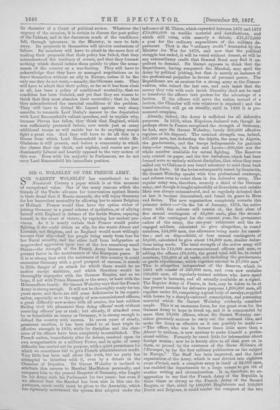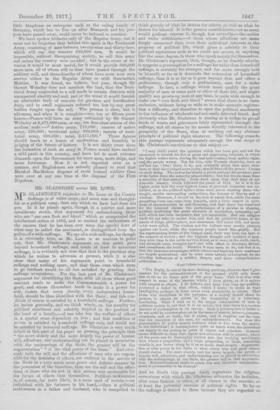SIR G. WOLSELEY ON THE FRENCH ARMY.
SIR GARNET WOLSELEY has contributed to the Nineteenth Century a paper which is at this moment of exceptional value. One of the many reasons which the friends of the Turks advance for intervention against Russia is their dread that if Russia succeeds, she will repay Germany for her benevolent neutrality by allowing her to annex Belgium or Holland. France would then have the option either of joining Germany in a grand scheme of spoliation, or of allying herself with England in defence of the feeble States, repaying herself, in the event of victory, by regaining her ancient pro- vinces. As it is nearly certain that France would prefer fighting if she could obtain an ally, for she wants Alsace and Lorraine, not Belgium, and as England would most willingly become that ally—half her people being ready from fear for her Naval security, and the other half from indignation at unprovoked aggression upon two of the few remaining small States—the strength of the French Army becomes an im- portant factor in the maintenance of the European peace. If it is so strong that with the assistance of this country it could encounter Germany with a good prospect of success, it stanch; in little danger of an attack for which there would be no motive except ambition, and which therefore would be thoroughly unpopular with the German Empire, and as we hope, if not with Prince Bismarck or the army, at least with the Hohenzollern family. Sir Garnet Wolseley says that the French Army is strong enough. It will not be thoroughly ready for ten years more, and there are still some deficiencies in its organi- sation, especially as to the supply of non-commissioned officers, a great difficulty now-a-days with all armies, the best soldiers finding civil life pleasanter than doing officers' work without receiving officers' pay or rank ; but already, if attacked even by so formidable an enemy as Germany, it is strong enough to defend the country with success. In seven years of steady, persistent exertion, it has been raised to at least triple its 'effective strength in 1870, while its discipline and the char- acter of its officers have been completely re-established. The French nation, immediately after its defeat, resolved upon its own reorganisation as a military Power, and in spite of every difficulty has carried out its purpose, with a quiet persistence for which we sometimes fail to give French administrators credit. Very little has been said about the work, but no party has attempted to interfere with it, even by a debate in the Chamber of Deputies. Sir Garnet Wolseley is inclined to attribute this success to Marshal MacMahon personally, and compares him to the present Emperor of Germany, who fought for his Army with his Parliament for two years ; but even if we allowed that the Marshal has been wise in this one de- partment, much credit must be given to the Assembly, which has rigorously maintained the system first adopted under the influence of M. Thiers, which expended between 1872 and 1876 £70,000,000 on warlike material and fortifications, and which still votes, with scarcely a debate, £21,675,000 a year for the ordinary expenditure of the military de- partment. That is the " ordinary credit " demanded by the Minister for War for 1878, and now that the political struggle has ended, it will be voted without demur, as will he any extraordinary credit that General Borel may find it ex- pedient to demand. Sir Garnet appears to think that the Republicans, having conquered the Marshal, may spoil the Army by political jobbing, but that is merely an instance of the professional prejudice in favour of personal power. The Republicans are as anxious for a strong army as the Conser- vatives, who ruined the last one, and only insist that the money they vote with such lavish liberality shall not be used to transform the officers intb gaolers for the advantage of a faction. If the officers will serve the nation instead of a faction, the Chamber will vote whatever is required ; and the transformation will go on steadily, until in 1886 it is pro- nounced complete.
Already, indeed, the Army is sufficient for all defensive purposes. In 1870, when Napoleon declared war, though he perhaps alone in France recognised the strength of Germany, he had, says Sir Garnet Wolseley, barely 300,000 effective regulars at his disposal. The nominal strength was, indeed, 567,000 men, but deducting the depots, the army in Algeria, the gendarmerie, and the troops indispensable for garrison duty—for example, in Paris and Lyons-300,000 was the whole number available for actual fighting. The Reserves only existed on paper, and the few battalions which had been formed were so entirely without discipline, that when they were called out to Chalons it was found necessary to send them back again to Paris. Of the levies subsequently raised by Gambetta, Sir Garnet Wolseley speaks with true professional contempt, and refuses oven to count them in the defensive army. The regular army was, therefore, scarcely a third of the German army, and though it fought splendidly at Gravelotte and outside Metz was always outnumbered, and so regularly defeated that at last it became demoralised, and found its grave in Metz and Sedan. The new organisation completely corrects this primary defect :—" On the 1st of January, 1878, the active army with the colours will consist of, the first class of five annual contingents of 83,000 each, plus the second- class of the contingent for the current year, the permanent cadres of the army, the one-year volunteers and the re- engaged soldiers, calculated to give altogether, in round numbers, 534,000 men, due allowance being made for casual- ties ; and en disponibilite, of four annual contingents of 50,000, calculated to give about 184,000 men, similar deduc- tions being made. The total strength of the active army will therefore be 719,000 non-commissioned officers andmen, or adding the officers (26,499), the grand total will be, in round numbers, 745,000 of all ranks, not including the gendarmerie or garde r4publicaine, which together amount to 27,000 men." This is altogether independent of the Reserve, which in 1881 will consist of 520,000 men, and even now contains 500,000 men, all regularly-trained soldiers who have spent four years in barracks, and all actually available at a signal. The Regular Army of France, in fact, may be taken to be at the present moment for defensive purposes 1,200,000 men, all regulars under 30, comprising a great body of cavalry, supplied with horses by a sharply-enforced conscription, and possessing material which Sir Garnet Wolseley evidently considers ample. This is an enormous force, far too great even for the German Army to hope to break up, and it is commanded by more than 26,000 officers, whom Sir Garnet Wolseley con- siders genuinely anxious to carry out the national idea, and make the Army as effective as it can possibly be made :- " The officer, who was in former times little more than a neur in uniform, is now anxious to make himself a profes- sional soldier. Formerly he cared little for information about foreign armies ; now he is keenly alive to all that goes on in them, as proved by the existence of the Revue 111111tcare de l'Etranger, by far the first military publication on the subject in Europe," The Staff has been improved, and the local organisation of the Army, which is now divided into eighteen corps d'arme'e, each a complete army in itself of 32,000 men, has enabled the departments to a large extent to get rid of routine writing and circumlocution. It is, therefore, no ex- aggeration to say that the French Army of the Republic is three times as strong as the French Army of the Second Empire, or that, aided by 100,000 Englishmen and 100,000 Dutch and Belgians, it could render the conquest of the two
little kingdoms an enterprise such as the ruling family of Germany, which has to live on after Bismarck and his pro- jects have passed away, could never be induced to sanction. Wo have spoken hitherto only of the Regular Army, but it must not be forgotten that behind this again is the Territorial Army, consisting of men between twenty-nine and thirty-four, which will one day number 638,000 men. It would be impossible, without disorganising society, to call this army out unless the country were invaded ; but in the event of in- vasion it would be most useful, for it would provide 500,000 more men, all of whom will in time have passed through the military mill, and three-fourths of whom have even now seen service either in the Regular Army or with G-ambetta's Mobiles. It was found, we believe, last year, though Sir Garnet Wolseley does not mention the fact, that the Terri- torial Army responded to a call made in certain districts with unexpected alacrity and zeal, and at the worst it would furnish an admirable body of recruits for garrison and fortification duty, and to swell regiments reduced too low by any great battles fought upon the soil. The process i3 slow, but it advances, and when it is complete—say, ten or fifteen years hence—Franee will have an army estimated by Sir Garnet Wolseley at 2,471,000 men, or say, ten first-class armies of the modern scale :—" Active army, 719,000 ; reserve of active army, 520,000 ; territorial army, 594,000 ; reserve of terri- torial army, 638,000 ; total, 2,471,000." Those figures should teach us a lesson of moderation and humility in judging of the future of history. It is not thirty years since the formation of such an army in Prance would have excited a wild panic in this country, and have led to most extreme demands upon the Government for more men, more ships, and more fortresses. Now it is not regarded even as a menace, and Englishmen are actually pleased to read that Marshal MacMahon disposes of more trained soldiers than were ever at any one time at the disposal of the First Napoleon.







































 Previous page
Previous page